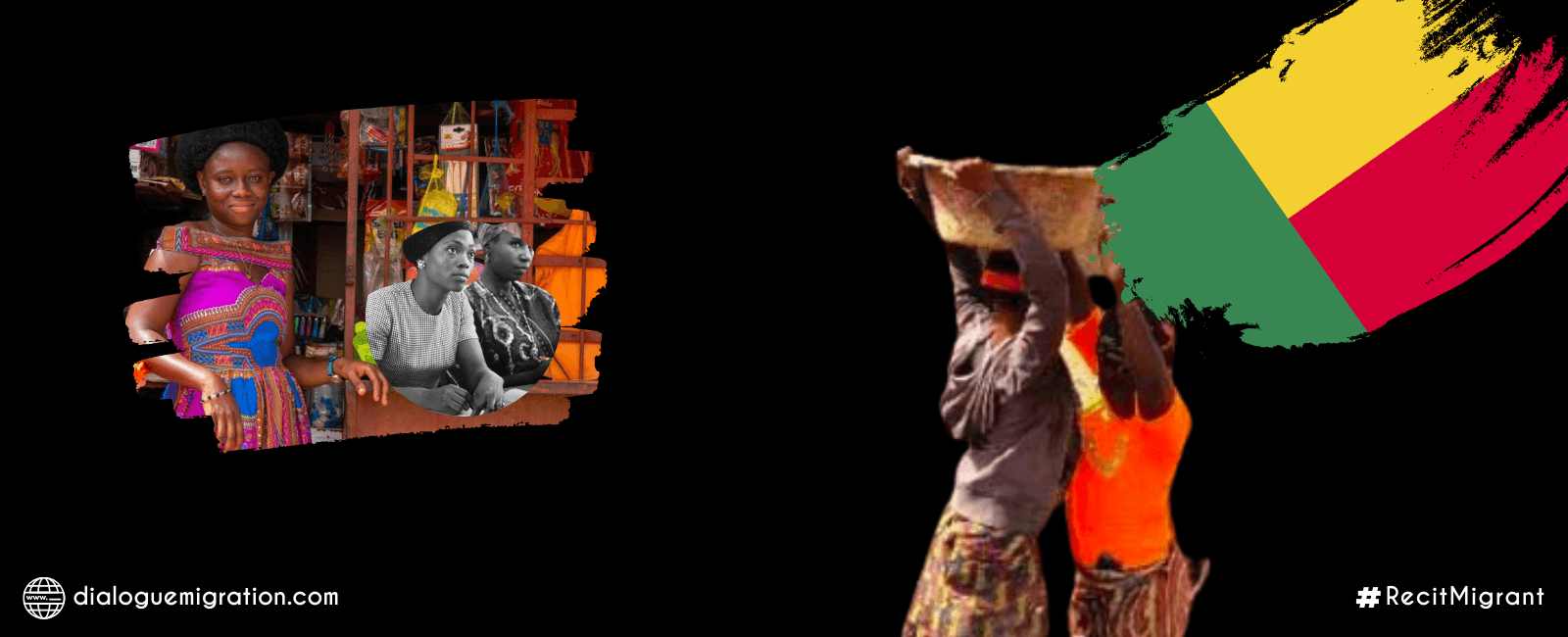

Gender is an observable theme at the heart of migration in the West African sub-region. As an integral part of the diverse communities living in Benin, women are one of the most vulnerable. Between the desire for integration, business opportunities and other issues, the experience of these women in Cotonou illustrates the reality of this social stratum, which is proving to be one of the main actors at the heart of sub-regional migration.
The feminisation of migration is one of the major trends in the world and, in particular, African migration. In 2020, women accounted for 48.1% of the global migrant stock and 47.1% in Africa, according to data published in March 2023 by The Conversation, a platform based on surveys conducted in nine countries, entitled “A Current Look at West African Cross-Border Mobility”.
The study points that economic autonomy, improvement of living conditions as well as evolving perception of women’s role and status through migration lead to a reconfiguration of family and social relations between the sexes.
Dialogue Migration met a worried Josephine at a gathering of Cameronians in Cotonou, the metropolis of Benin. Responding to Dialogue Migration, she says “I have problems, “ and refused to say more. Women are estimated to make up more than 50% of the hundred or so people gathered.
Thérèse, too, arrived in Benin around three weeks ago when Dialogue Migration met her. This Cameroonian came to the country following the invitation of aChadian friend who lives in Cotonou. Thérèsehad stayed in Chad where she worked as a hostess for the promotion of a mobile phone brand. In the end, the restaurant-bar project that she was supposed to set up with the Chadian woman in Cotonou did not prosper. Between the disappointment and returning home, or settling in Benin, Thérèse, who swallowed up her savings for her flight from Douala to Cotonou, and the infrastructural steps of the project remain torn. “I came for a project with one of my friends who lives here in Benin. But the project could not be realised. I’m going to see if I can get other job opportunities or go back to the country altogether,” she confesses. With a worried look, she never fails to point out the difficulties that can be encountered for a woman outside her country. As the mother of a daughter whom she left with her mom in Cameroon, her main concern is now to find a job that will allow her to regularly send money to her mother to take care of her.
In Benin, the Guaranteed minimum interprofessional wage (SMIG) is 52,000 of franc CFA since January 1, 2023. “I’m a foreigner, what am I going to do with it? I have to rent, maintain myself and send something back home,” Thérèse worries, even though the cost of living in Cotonou is not the same as in Douala. In the Beninese metropolis, for some private employers, it is not easy to pay this sum, which previously was 40,000 CFA francs. Thérèse, for her part, hopes to earn at least 60,000 francs in salary so that she can start her own business, currently sharing a flat with her friend, and support herself and her family.
“As I know how to do cash and from my experiences in Cameroon and Chad where I have worked to promote a phone brand, the only interesting offer that a lady made me to serve and manage the cash register of her restaurant was 40,000 CFA francs,” she informs.Apart from that, the other proposals are not interesting . “All the jobs I am offered are night jobs, waitresses at the bar or in the maquis. The salary is not good,” she says.
Successful Integration
Some migrant women living in Benin, despite the ups and downs, manage to integrate and flourish. Running a maquis in the vicinity of the Friendship Stadium, Sephora is an Ivorian. She came to Benin in the tumult of the Ivorian crisis of 2010-2011, and her refugee status remains little known. “People never knew we were refugees. Ivorian cuisine is very popular and we don’t lack customers,” she admits, surprised to be approached for an interview, following a recommendation from one of our sources, head of an association of refugees living in Benin. However, she was in contact with the National Agency for Civil Protection (ANPC), until 2021 when Ivorian refugees were demobilised to return to their country thanks to the dialogue established by political leaders.
In Benin, during the crisis, there were no camps for refugees. They lived among the population, each within his/her own framework of convenience and supported by the ANPC with the support of UNHCR. Apart from her, another Ivorian woman runs a renowned restaurant, specialising in Ivorian dishes in the Akpakpa district, one of Cotonou’s lively corners. Her maquis is named after one of the dishes and is a great attraction. There are Ivorians, Beninese and other lovers of Ivorian cuisine. Like many Ivorians who came to Benin during the 2010-2011 post-election crisis, they remained in the country where they found a land of asylum and business development. Apart from the latter, others had been living in the country for a very long time. When they immigrated, they settled and fulfilled themselves.
Mixed situation…
In Benin, the situation of some migrant women is not always good. Especially bar waitresses and others. A situation that is not dramatic either, as in some countries, although they are not so well off that can satisfy defenders of workers’ rights, including the Confederation of Autonomous Trade Unions of Benin (CSA-Benin), according to its Secretary General, Anselme Coovi Amoussou.
“When you stay in the ranks of bourgeois migrants,those who are in formal employment who have made a regular migration; Quite often there is no difference in treatment as such. But we know that the vast majority of them end up in the informal economy,” notes the SG of CSA-Benin, which is committed to the cause of migrant workers in Benin.
Referring to the case of bar waitresses, most of whom are from Togo, “This is a disaster,” he said. They experience everything and its opposite, says the trade unionist. “There is no salary because what they are given cannot be called salary; They have no social security coverage, they have practically no rights. When the employer decides to fire them, they fire them. Sometimes there are cooking rights to start working. They live in deplorable conditions. Sometimes severals are crammed into small rooms. And as soon as the boss decides that you can’t work anymore or you are blamed for something that is minor. At that point, you have to leave,” says Anselme Coovi Amoussou.


